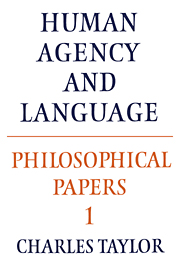4 - The concept of a person
Published online by Cambridge University Press: 05 June 2012
Summary
In volume 2, chapters 3 and 4, I trace the conflict between two philosophies of social science. But the two underlying views do not just confront each other in social science. They also polarize the other sciences of man – psychology, for instance; and beyond that they inspire rival pictures of morality and human life. I want here to explore some of these deeper ramifications, by looking at two conceptions of what it is to be a person.
Where it is more than simply a synonym for ‘human being’, ‘person’ figures primarily in moral and legal discourse. A person is a being with a certain moral status, or a bearer of rights. But underlying the moral status, as its condition, are certain capacities. A person is a being who has a sense of self, has a notion of the future and the past, can hold values, make choices; in short, can adopt life-plans. At least, a person must be the kind of being who is in principle capable of all this, however damaged these capacities may be in practice.
Running through all this we can identify a necessary (but not sufficient) condition. A person must be a being with his own point of view on things. The life-plan, the choices, the sense of self must be attributable to him as in some sense their point of origin. A person is a being who can be addressed, and who can reply.
- Type
- Chapter
- Information
- Philosophical Papers , pp. 97 - 114Publisher: Cambridge University PressPrint publication year: 1985
- 42
- Cited by



